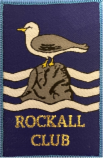Why the name Rockall? It has been suggested that the current name is a derivation of ‘Rock
Hall’, after Basil Hall, but it appears on a Portuguese chart of 1550 as
‘Rochol’, and one of 1606 as ‘Rocol’. It is possible that it derives
from the Gaelic ‘Roc-ail’ meaning ‘all rock’. Other early forms of the
name are ‘Rokol’, ‘Rokel’, ‘Rookol’, ‘Rokele’, and in 1698 ‘Rokal, or
'Rokabarra’ (Holland GS & Gardiner RA, 1975).
How do I get to Rockall? The best way to get to Rockall is by chartering a boat (unless you have your own!). There are, at this time, no companies are offering trips or charters to Rockall.
How long does it take to get there? The journey time is wholly dependent on the weather, as well as the type of boat chartered. A motor vessel from Leverburgh, for example, will take a minimum of 13 to 15 hours to travel to Rockall. A yacht may take anywhere between 16 hours and several days to reach Rockall dependant on the weather conditions and wind direction. There may be times when any boat has to turn back due to bad weather or swell.
What are the current occupation records? There are two occupation records: 1. the longest solo unsupported occupation and 2. the longest total occupation. These are both currently held by Nick Hancock at 45 days. There is a third record for the most number of landings on Rockall by an individual in seperate years; this is currently held by Al Baker with three seperate landings to his name.
How are the occupation records defined? It is accepted in the expedition community that 'solo' means a single person alone for the entire length of their expedition, as was the case for both Tom McClean and subsequently Nick Hancock.
An 'unsupported' expedition is one that des not benefit from any external resupply, cache or depot of food and/or equipment during the course of the expedition; that does not off-load or discard anything during the expeidtion, except for human waste and grey water; does not enter any vehicle or shelter other than its own; that is not aided by any vehicle providing physical or physchological support; or one where any members of the team are evacuated. Therefore, the Greenpeace occupation, where the team on the rock was rotated over time and resupplied from a support vessel, was supported.
Using these definitions, both Tom McClean and Nick Hancock were solo and unsupported, whilst Greenpeace were neither but, at that time, had occupied Rockall longer than anyone previously.
Does anyone live there? No-one lives, nor has every lived permanently, on Rockall due to its size, remoteness, and the lack of freshwater. In 1985, Tom McLean lived on on the rock without resupply for 40 days, and in 1997 Greenpeace rotated a team which spent a total of 42 days on the islet. In 2014, Nick Hancock occupied Rockall solo and unsupported for a record 45 days.
Where can I buy postcards, photographs, DVDs, etc? The Rockall Club hopes in the future, to be able to offer postcards, copies of the rare 1957 book 'Rockall' by James Fisher and a DVD about Rockall. Funds raised from these sales will be used by The Club to promote the interests of The Rockall Club, purchase historic memorabilia and artifacts pertaining to Rockall for The Club's archive as and when it becomes available. Authenticated Members of The Rockall Club are able to purchase Rockall Club patches, which are based on the 1978 Scouts District Badge for Rockall. Please contact The Secretary for further information and cost.

Mike Schofield offers a range of photographs of Rockall, which can be ordered via his website.